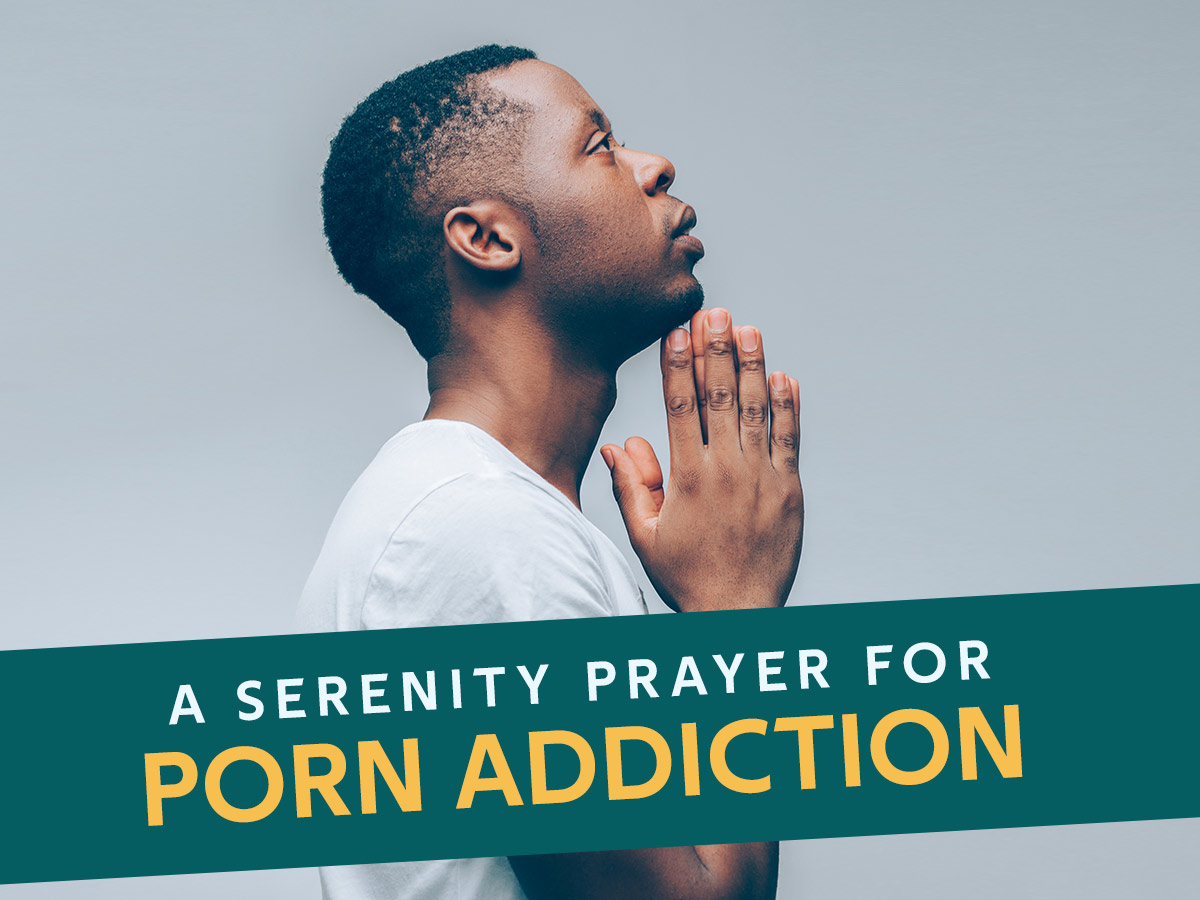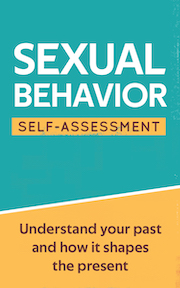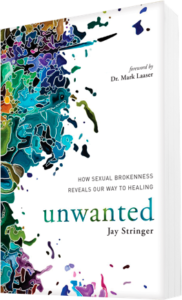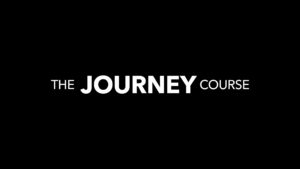by Jay Stringer
The Serenity Prayer
God, grant me the serenity to accept the things I cannot change,
Courage to change the things I can,
And wisdom to know the difference.
– Reinhold Niebuhr
Whether it’s the use of pornography, infidelity, hookups, or buying sex, unwanted sexual behavior will inevitably affect you or someone you love. And in case there was any fear that you’re an isolated case, consider the statistics:
- In 2018 alone, the leading porn site in the world received 33.5 BILLION visits (91.7 million per day).
- 30% of pornography users are believed to be women.
- Roughly one-third of marriages will be impacted by infidelity.
- In one study, researchers tried to find a control group of men who had never seen pornography. They could not find anyone.
If you have ever tried to outgrow or quit using porn, you know what it’s like to feel either overly powerless or powerful in your attempts to change. Those who depend on their own power to overcome a porn addiction say, “I’ve got this! This is finally going to be the year I break this habit.” The common refrain for those who feel powerless is: “I’m always going to be screwed up. What’s the point in even trying to change?” Both approaches are cul-de-sacs. Neither lead to freedom.
The life-changing insight The Serenity Prayer offers is that we are both powerless and powerful…at the same time. Each of us have areas of our life that we are powerless to change. Each of us also have the ability to make changes in our lives today that will positively change the course of our lives today. The Serenity Prayer asks you to face that you are less powerful than you might desire, but far more powerful than you ever could have believed.
Although The Serenity Prayer is most recognized for its use within alcoholics anonymous and other twelve-step programs, it’s really a prayer for anyone looking for a path to healing. Rather than providing tips and techniques to manage your lust or merely learn about the side effects of porn, The Serenity Prayer brings you to the root of your problems. Instead of simply offering a more sex-positive approach, the prayer asks you to face of uncomfortable truths with an uncommon courage. This simple and eloquent prayer has so much to teach us.
Let’s look at the prayer, line by line.
Accept the things I cannot change
When you first take a good, hard look at your life, it’s a fair bet you’re not going to like a lot of what you see. In fact, you didn’t have a choice about any of the most significant realities of your life. You didn’t choose your parents, your race, your earliest wounds, your IQ, your physical appearance, or your genetic disposition towards particular unwanted behaviors. The serenity prayer says that each of those are aspects of your life that will invite your acceptance. To be clear, acceptance doesn’t mean you like the story you were given. But it does mean you’re willing to acknowledge there is little you can do to change them.
Porn Addiction is not random
In the research I completed for my book Unwanted: How Sexual Brokenness Reveals Our Way to Healing, I found that the self-destructive sexual choices are not random. They followed a long and predictable course. The use of pornography, pursuing extra-marital affairs, and buying sex were both shaped and predicted by the parts of a person’s past that remained unaddressed. Therefore, if you want to find freedom, it will come to the extent to which you can accept that there are significant stories negatively shaping your life.
Addiction research has taught us that our destructive behaviors have a predictable course. World-renowned psychiatrist and author Gabor Maté writes, “Not why the addiction. But why the pain.” In Unwanted, I identified several key childhood drivers that surprisingly shaped self-destructive sexual behaviors in adults. These included a family system that was overly rigid or disengaged, as well as childhood traumas like bullying or sexual abuse. In the same way that depression might be a signal inviting someone to grieve a significant loss, a porn struggle invites us to accept that there are painful stories within us which drive us toward our unwanted behaviors.
In one of my favorite books, Can You Drink The Cup? Henri Nouwen uses the communion cup as the metaphor of life. Nouwen invites us to first hold our cup and ask, “What have I been given to drink?” Looking inside our cup, we see our mother and father, childhood wounds (e.g. middle school, the prototype of hell), our lifelong addictions, persistent loneliness, and unhealthy relational patterns. While we’d love to turn away from our cup or ask for a new one, Nouwen challenges us to a counterintuitive approach– to lift it up and say, “This is my life.”
What’s in your cup?
What do you feel when you look inside the cup of your life? Some might be tempted to throw out the contents of their cup, some hide their cup from others, and still others work tirelessly to add positive experiences in the hopes that they will someday outweigh the bad. As you can see, most paths we choose do not ask us to accept the life we’ve been given. The consequence of not accepting our life is to flee to the cup of porn fantasy.
Healthy recovery is about resisting the temptation to try to re-up attempts to manage lust. The keys to the freedom you seek could very well be embedded within your unwanted behaviors. So instead of trying to “stop” your sexual brokenness, the more generative approach is to be curious about what stories are driving you to them. A large part of acceptance is recognizing that the starting point of your brokenness is further back than you may have initially thought.
Unwanted sexual behavior is so appealing because it allows us to escape pain. But if we’re honest, we know that it also intensifies our pain too. It’s like a Band-Aid, covered in bacteria. Rather than trying to escape your pain, explore what wounds might be asking for your engagement. If you’re wondering where to even begin, know that you’re not alone. Be sure to read until the end of the article where I cover the best resources for the journey to freedom.
Courage to change the things I can
While the past invites you to the journey of acceptance, the present invites you develop courage. Without courage, the temptation is to believe you will never have what it takes to change. Most of us will try some version of a New Year’s resolution, an internet monitoring software, or accountability in the hopes that they will change us. When these efforts to manage lust do not work, we are led to believe we must be broken beyond repair. Add that to a stalled career or heartache in a meaningful relationship, and the evidence seems to suggest we are more powerless than powerful.
Powerlessness however is the birthplace of courage. Facing our wounds and developing courage is hard, iterative work. Knowing this, our brains get excited to show us the path of least resistance. Fantasy allows us to (temporarily) avoid the path of pain by way of a shortcut to a different life. Courage brings us to the two-choice dilemma that is always before us: outsource the solution to a fantasy or develop an inner life capable of moving through the pain. Addiction certainly exists, but the core war we have is with freedom.
The Allure of Fantasy
The Journey (a faith-based online course to find freedom from porn) begins with watching a film where the main character is so transfixed on the object of his lust that nothing can stop him. The seas of life have washed him up on a distant shore. Rather than thinking about the path that got him there or developing the courage to navigate a better path forward, he’s seduced into a fantasy. He ends up pursuing a woman who has been violently objectified, and when he finally traps her, he realizes he’s been duped. Shockingly, the object of his fantasies is full of maggots—he’s been robbed.
Like the character in the film, you know all too well that porn use is a great escape, but an even better thief. Courage is how we take back ownership of our lives. If courage is to lead to significant change, it must be holistic in scope. Many people mistakenly believe that developing courage is primarily about stopping a maladaptive pattern or telling someone else their battle with porn or extra-marital affairs. While refraining from unhealthy choices and choosing vulnerability can be effective, my research found they did not lead to freedom.
Just as porn addiction is not random, the path of courage is not random either. Two ways you can choose a holistic approach to courage today are 1) facing your sexual fantasies directly and 2) developing a clear sense of purpose. Let’s take a deeper look at what each of these are and how you can develop the courage to transform them.
1)Sexual Fantasies
At some point during my work with a client, I will ask them to share some of the specifics of what they find arousing. When I do, some of them just about fall out of the couch. After the shock wears off, they tend to ask me something along the lines of, “Why is that even important?” What I tell them is that each of us have an arousal template. This is a constellation of images, thoughts, sensations, times of day, and relational archetypes that we find arousing. While many people attempt to stop their lust, courage begins when we are able to listen to it. Listening to your lust is about seeing fantasies as teachers rather than irrefutable evidence that we are beyond repair.
Take a moment to think about a sexual fantasy you keep returning to or a porn scene you keep going back to? Rather than trying to indulge or run from fantasies, interrogate them. Ask yourself, “Why am I so drawn to that specific search?” or “What was going on in my life when I first started watching porn?” or “Who originally introduced me to porn?”Did anything come to mind? My research found that every one of those fantasies has something to teach us, if we are willing to pay attention.
Your life story shapes your fantasies
The difficulties you face are shaping your sexual fantasies. One example of this is that women who tended to report unmet needs could be almost 5x more likely to pursue or think about pursuing an affair. Men who felt like failures in their jobs or relationships were more likely to pursue sexual fantasies with younger women or those who appeared to them, as more submissive. As you can see, if you are not listening to the symptoms of your life, you will construct fantasies that alleviate the tension. If you want to see what your sexual fantasies might say about you, be sure to check-out the Sexual Behavior Self-Assessment.
2)Lack of Purpose
The more you lack purpose, the more porn you will watch. One of the most powerful associations in my research study was between pornography use and purposelessness. In fact, without a clear sense of purpose, people were seven times more likely to increase their use of pornography. Such people reported personal lives rife with disappointment, experienced difficulties in their careers, and looked back at their lives and saw significant failure.
It’s crucial to understand the implication of this key driver of unwanted porn use. Attempting to overcome an your bond with porn without having a plan to engage your lack of purpose will never be effective. Pornography does not happen in isolation from other dimensions of your life. If not for porn, how else would you address feelings of futility? When a romantic relationship is full of strife or non-existent, where else would your anger go? The problem many people find in recovery is that they attempt to stop porn use while doing next to nothing to transform the lack of purpose driving us to it.
The main takeaway is that porn use will function like a squatter in an abandoned house when you feel thwarted in finding purpose. If you want to see your personal life and career transform, evict the squatters through focusing on a vision of who you want to become-whole, purposeful, and alive. Courage isn’t about fighting your sexual desire, it’s about fighting to discover meaning.
And Wisdom to Know the Difference
The final line of the serenity prayer is a call to action. So far, it’s invited you to see that are stories you are both powerless and powerful to change. Now, it’s asking you to develop wisdom to know the difference as you begin the path to freedom. As you look at the cup of your life, what do you believe is the wisest choice for this season ahead of you? Is it to accept a difficult truth regarding your past or is it to develop the courage to face your fantasy life or lack of purpose?
Acceptance and courage are opposite sides of the same coin. Whether wisdom initially directs you to acceptance or courage, recognize that they are not like menu options you get to pick or choose. Those who find freedom from porn dependence must grapple, in different seasons, with acceptance and courage. Wisdom is the process of recognizing which what side of the coin your life most needs to engage.
As you begin your journey to freedom from porn addiction for the 1st or 931st time, I want you to know that there is a path to healing that can be both kind and curious. There are far too many approaches to outgrowing porn that ask you to fight or be at war with your sexual desires. I have good news – it does not have to be that way. At the same time, I know you will need resources that will serve as guides along the way. For that reason, I want to share a few resources that are helping thousands of people just like you to identify and transform the porn problems in your life. If you’re longing for guidance, be sure to check out each of these resources.
3 Resources To Find Freedom From Porn Addiction:
1. Do you love reading or listening to books? If so, check out Unwanted: How Sexual Brokenness Reveals Our Way to Healing. It’s an award-winning book based on my research on nearly 4,000 men and women struggling with porn and other unwanted sexual behaviors. The central premise is that your porn problem is not a life sentence to sexual addiction, but a roadmap to healing.
2. Do you love learning fascinating insights about yourself? Take the Sexual Behavior Self-Assessment. The self-assessment will identify the specific themes in your story that influence your involvement with porn. For under a $20 investment, you will receive a custom 40+ page report that shows you:
- Key childhood drivers of sexual brokenness in your story
- Current roadblocks you’re facing that predict your sexual choices.
- Specific sexual fantasies you pursue and what they might be trying to tell you.
3. Are you ready for the journey to freedom? The Journey is a 5-month path to freedom from sexual brokenness for men and women. Through 18 episodes and over ten hours of video content, you will learn the origins of your sexual brokenness, what sustains them, and how to transform them. This online course is life-changing and is being endorsed by treatment professionals and men and women whose lives have been transformed. The course includes:
- 18 episodes
- 5 months of curriculum
- The Sexual Behavior Self-Assessment
- The Heart of Man film
- A private FB community
The Journey course is only $24.99 per month so anyone can begin their path to freedom from sexual brokenness. Enroll today or check out a free preview episode.
Porn Addiction Is A Roadmap To Healing
The serenity prayer shows us how porn addiction has the potential to reveal our way to healing. Although we are prone to hiding or despising our sexual problems, we need the humility to recognize that there is far more that we do not understand about why we are drawn towards it. You do not need to spend the best years of your life trying to annihilate your sexual desire or strategize about how to manage your lust. There is a better path. Freedom is closer than you think.
Jay Stringer is a licensed mental health counselor, ordained minister, and author of the award-winning book Unwanted: How Sexual Brokenness Reveals Our Way to Healing. Stringer holds an MDiv and master in counseling psychology from the Seattle School of Theology and Psychology and received post-graduate training under Dr. Dan Allender while serving as a Senior Fellow at the Allender Center. Jay lives in New York City with his wife Heather and their two children.







